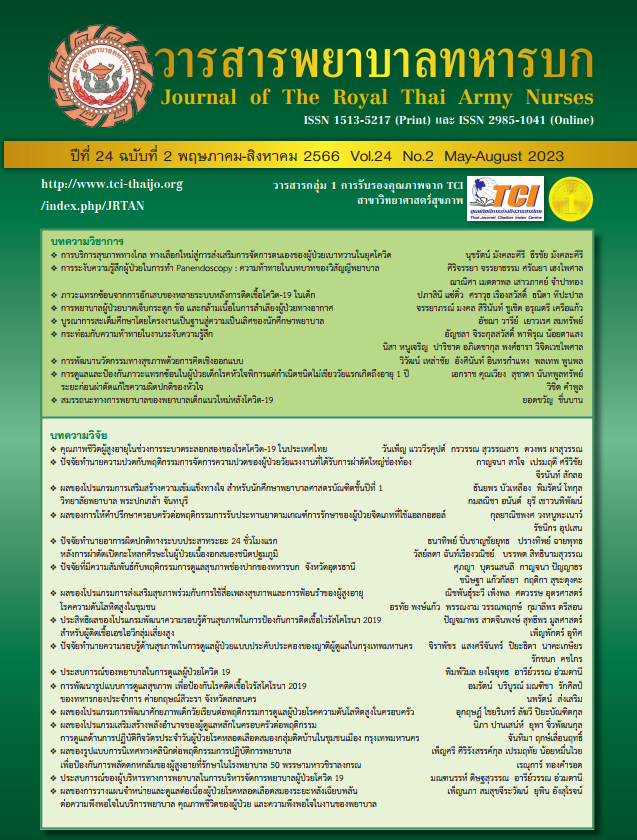Study of Age-Friendly City in Health Region 5th
Keywords:
age-friendly city, older adult, communityAbstract
The study is a descriptive research using mixed methods. The study aimed to investigate levels and characteristics of the age-friendly city and factors influencing on perceptions of older adults in Health Region 5th regarding the age-friendly city. The samples were 445 older adults in Health Region 5th. This sample size was identified by using Taro Yamane’s table. Furthermore, 130 older adults were the samples of identifying factors influencing on perceptions of the older adults regarding the age-friendly city. This was indicated by using G*Power. The instruments were composed of the demographic and age-friendly city questionnaires and the structured open ended questions about the age-friendly city characteristics of communities. The reliability of the questionnaires tested using Cronbach’s alpha was 0.81. The researchers collected the data between December 2022 and February 2023. The quantitative data were analysed by using descriptive statistics and multiple regression. The qualitative data were analysed by using thematic analysis. The results show that the level of age-friendly city perceived the older adults was in the high level ( = 3.46, S.D. = 0.73); underlying disease could predict the perceptions of the older adults regarding age-friendly city with 0.05 significant level. The knowledge gained from the study can be utilized in policy making, improving service practices, and developing education relating to care of the older adults.
Downloads
References
World Health Organization. Age-friendly World: About the Global Network for Age-friendly Cities and Communities. N.p.; 2022. (in Thai).
Department of Health. Guidelines for Driving Group Work of Older Persons Focusing on Age-friendly Communities/Cities. N.p.;2021. (in Thai)
Department of Older Persons. Statistics of older persons in 2022. N.p.;2023. (in Thai).
MOU of An Integrated Collaboration in Long Life Development (Early childhood and Elderly). N.p.; 2022. (in Thai).
Department of Provincial Administration. Official statistics registration systems: statistics of population. N.p.; 2022. (in Thai).
Assawamaitree S, Hongsranagon P. The association between the perception of age-friendly city features and the mental health status of the elderly in Photaram District, Ratchaburi province, Thailand. Journal Health Research. 2017; 31(Suppl.2): S137-42.
Wang YF, Hongsranagon P, Havanond P. Assessing age-friendly features and needs of elderly toward age-friendly city in Muang district, Ratchaburi province, Thailand. Journal of Health Research. 2015; 29(Suppl.2): S159-67.
van Hoof J, Marston HR, Kazak JK, & Buffel T. Ten questions concerning age-friendly cities and communities and the built environment. Building and Environment. 2021; 199: 1-26.
Pattamason T, Sirinkornand C, & Faiyuea R. Needs and Expectations of the Elderly Friendly Community of Arunyik Municipality, Phitsanulok. Journal of Roi Kaensarn Academic. 2021; 6(7): 204-18. (in Thai)
Muangkasem B. The Model of Age-Friendly City in Ban Du Subdistrict, Muang District, Chiang Rai Province. Journal of MCU Humanities Review. 2021; 7(1):239-54. (in Thai)
van Hoof J, Dikken J, Buttiġieġ SC, van den Hoven RFM, Kroon E, Marston HR. Age-friendly cities in the Netherlands: An explorative study of facilitators and hindrances in the built environment and ageism in design. Indoor and Built Environment. 2020; 29(3):417-37.
Thongsrikate I. Implementation of the Public Spaces among Urban Elderly in Chiang Mai: A Mixed-methodology Study. Nakhon Lampang Buddhist’s Journal. 2021; 10(3):50-67. (in Thai)
Jadesadalug V & Sangngern K. Guidelines for The Development of Transport Services for The Elderly in Ratchathewi District, Bangkok. Veridian E-Journal, Silpakorn University. 2018; 11(1); 3032-47. (in Thai)
Sripumee K & Bejrananda M. Travel Behavior for Elderly People in the Khon Kaen City. Built Environment Inquiry Journal, Faculty of Architecture, Khon Kaen University. 2022; 21(2)129-43. (in Thai)
Changprachak P. The Employment of The Elderly in Thai Society: Knowledge from The Synthesis of Research from ThaiLIS Digital Collection. Journal of MCU Nakhondhat. 2021; 8(10):100-12. (in Thai)
Liemsuwan T. Ageism of Working–Age in Chon Buri Province: Results of the Fraboni Scale of Ageism (FSA). JLA. 2019; 11(2):223-44. (in Thai)
Meetathip S. The Relationships between Knowledge, The Number of Drugs Used and Drug Use Problems among Elderly Patients with Chronic Illness at A Medical Clinic. Journal of Royal Thai Army Nurses. 2023; 23(3):504-11. (in Thai)
Downloads
Published
How to Cite
Issue
Section
License
Copyright (c) 2023 Journal of The Royal Thai Army Nurses

This work is licensed under a Creative Commons Attribution-NonCommercial-NoDerivatives 4.0 International License.
บทความหรือข้อคิดเห็นใดใดที่ปรากฏในวารสารพยาบาลทหารบกเป็นวรรณกรรมของผู้เขียน ซึ่งบรรณาธิการหรือสมาคมพยาบาลทหารบก ไม่จำเป็นต้องเห็นด้วย
บทความที่ได้รับการตีพิมพ์เป็นลิขสิทธิ์ของวารสารพยาบาลทหารบก
The ideas and opinions expressed in the Journal of The Royal Thai Army Nurses are those of the authors and not necessarily those
of the editor or Royal Thai Army Nurses Association.






